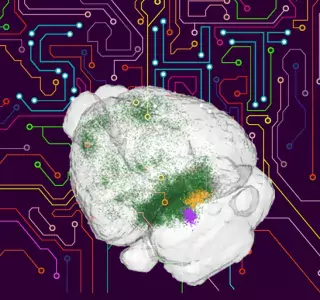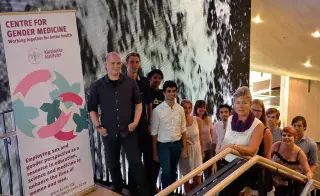News archive
On this page you can search for older news. Choose a topic, type of news or enter your own keyword to filter out news.
View compact
[Edit: Bengt Samuelsson passed away on July 5, 2024. This article was written in 2014.] Karolinska Institutet’s former Vice-Chancellor, the Nobel Prize Laureate Bengt Samuelsson, reached the age of 80 in 2014. At the end of August that year, researchers from around the world, met up to honour him as founder of the research field Lipid Mediators with a three-day symposium.
News
Karolinska Institutet’s online courses will be available for everybody on the shared platform edX.org which is a non-profit platform that was founded by the two leading universities Harvard and the Massachusetts Institute of Technology (MIT).
News
The sensitivity of fat cells to signals that increase the breakdown of fat is linked to the receptor ALK7, according to a study by researchers at Karolinska Institutet. The discovery, which is published in the new scientific journal eLife, suggests that ALK7 might be an interesting target for future strategies to treat obesity.
News
A new study from Karolinska Institutet provides insight on how the brain processes external input such as touch, vision or sound from different sources and sides of the body, in order to select and generate adequate movements. The findings, which are presented in the journal Neuron, show that the striatum acts as a sensory ‘hub’ integrating various types of sensory information, with specialised functional roles for the different neuron types.
News

With the aid of new methods, a research team at Karolinska Institutet have developed a detailed map of the networks of the brain that control the neurotransmitter serotonin. The study, published in the scientific journal Neuron, may lead to new knowledge on a number of psychiatric conditions and the development of new pharmaceuticals.
News
A number of relatively common gene variations combined may increase the risk of autism. These are the findings of a new study from Swedish and American researchers published in Nature Genetics.
News
Researchers at Karolinska Institutet have headed a study that provides new knowledge about the EphA2 receptor, which is significant in several forms of cancer. This is important knowledge in itself – but just as important is how this study, which is published in the highly respected journal Nature Methods, was conducted.
News
Johan Sandberg, who has worked at Karolinska Institutet since 2003, was appointed Professor in 2013 at Center for Infectious Medicine (CIM), Department of Medicine, Huddinge.
News
Professor Gunilla Karlsson Hedestam at the Department of Microbiology, Tumor and Cell Biology (MTC) at Karolinska Institutet, receives a PO1 grant from the National Institutes of Health (NIH).
News
The European Molecular Biology Organization, EMBO, announced on May 7th that 106 distinguished researchers in the life sciences were newly elected to membership in the organisation.
News

On 31 March, people packed Karolinska Institutet’s Aula Medica to hear Bill Gates talk about how extreme poverty can be eradicated from the world during our lifetime.
News



